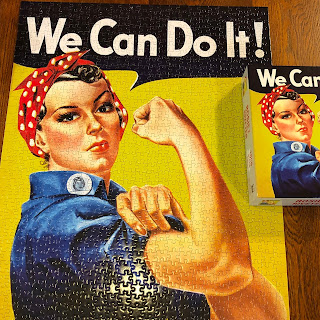Fab Feb - A Few Friends
✅Fitness - #28bysamwood 'Total Recall'
✅Alcohol Free
✅Friends
❌Food fail - jelly and ice-cream
A few friends brightened an otherwise ordinary day.
I had to attend 'Cultural Diversity Training' just in case I'm lucky enough for a course convenor to select me from the university database of potential casuals for some tutoring or marking. I was relying on coffee to pep me up for the 5pm session but there was a tragedy - the coffee cart en route was closed. Instead, I was pepped up by the surprise appearance of a few friends I didn't expect to be there. One was a friend from nearly 20 years ago when we were in a church mums' group together. I'd love to rekindle the friendship but it hasn't happened from the few brief moments we've run into each other at uni. Another friend was from one of my teaching positions. When I first met her six years ago I wasn't sure I was going to like her but we ended up working really well together. It's another friendship I'd like to do better at. The last surprise was a friend who has just finished her PhD. The first time I met her, about a year ago, we talked for three hours and understood each other immediately. Just a couple of weeks ago we ran into each other again while I was having coffee with someone she didn't know. I had a good feeling that these two would get along and they too hit it off straight away. However, on this occasion we were unable to find a chance to talk at all. Next time.
As for the training itself, I didn't really learn anything new. I jotted down a couple of references to acts of law that I didn't know. That's it. I have my teacher training to thank for that. More so, my actual teaching. Society and Culture is an extremely under-rated subject. It allows students to think deeply and critically about the world they live in and understand a little of what it is like to walk in another person's shoes. Teaching Society and Culture was a constant reminder to have an open attitude and an awareness that not everyone's culture is the same as your own.
As for the training itself, I didn't really learn anything new. I jotted down a couple of references to acts of law that I didn't know. That's it. I have my teacher training to thank for that. More so, my actual teaching. Society and Culture is an extremely under-rated subject. It allows students to think deeply and critically about the world they live in and understand a little of what it is like to walk in another person's shoes. Teaching Society and Culture was a constant reminder to have an open attitude and an awareness that not everyone's culture is the same as your own.
On the research front, an article about enterprise education in schools that I missed in my MRES came to my belated attention. The overview showed it had promise, in that it was right in the area of my research and fitted my biased preferences. However, once I hit the literature review section I started to have some concerns about the way it was written. There were sweeping statements, poorly linked concepts and broad terms used when more precision was required. I started thinking about how much my reading and writing of academic literature had improved from completing my MRES and how happy I am to have a supervisor who guides me so well. But then I started thinking about how arrogant I was to be thinking like that. The Robinson (2006) reference raised my interest. Given the context, I was thinking it was probably Sir Ken Robinson, champion of creativity in schools. I looked up the reference list. Yep, I was right. Yay me! I thought though it would be to some paper he had written but no, it was to his TED talk. Not the usual type of citation in an academic paper. I checked another reference and another reference and another. Until I had checked all on the page. Most of the references were to non-academic sources, highly unusual for an article in an academic journal and certainly not best practice. I marked them in red, the academic references in blue and the institutional reports in green. I tweeted this colourful examination with "When you think you're reading an academic paper but it has more references to newspapers (eg The Telegraph), magazines, TED talks and the like (marked in red) than academic literature (marked in blue)". It gained a little traction and I received a bit of encouragement from one of the enterprise education gurus from the other side of the world. It was nice. I meet with a librarian soon. I will be asking her about how to judge the merit of particular journals. I will also ask my supervisor next week about how to treat such papers.
At home, we are trying to use up as much of our consumable items as possible to reduce the amount we have to move. For instance, I'm delaying the purchase of hair and skin products. Seems silly given how small these items are in relation to the amount of stuff we have. So when we find a packet of jelly just past its use by date, it has to be eaten. Which meant ice-cream was also required. Oops.
So there you have it. An ordinary day.



Comments